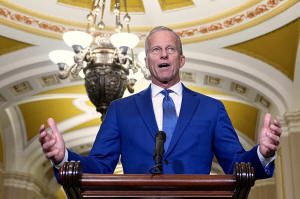Senate votes to move ahead with Trump's request for $9 billion in
spending cuts
[July 16, 2025]
By KEVIN FREKING
WASHINGTON (AP) — Senate Republicans on Tuesday advanced President
Donald Trump's request to cancel some $9 billion in previously approved
spending, overcoming concerns from some lawmakers about what the
rescissions could mean for impoverished people around the globe and for
public radio and television stations in their home states.
The Senate vote was 50-50, with Vice President JD Vance breaking the
tie.
A final vote in the Senate could occur as early as Wednesday. The bill
would then return to the House for another vote before it would go to
Trump's desk for his signature before a Friday deadline.
Republicans winnowed down the president's request by taking out his
proposed $400 million cut to a program known as PEPFAR. That change
increased the prospects for the bill's passage. The politically popular
program is credited with saving millions of lives since its creation
under then-President George W. Bush to combat HIV/AIDS.
The president is also looking to claw back money for foreign aid
programs targeted by his Department of Government Efficiency and for the
Corporation for Public Broadcasting.
“When you’ve got a $36 trillion debt, we have to do something to get
spending under control," said Senate Majority Leader John Thune, R-S.D.

The White House tries to win over skeptics
Republicans met with Russ Vought, the director of the White House Office
of Management and Budget, during their weekly conference luncheon as the
White House worked to address their concerns. He fielded about 20
questions from senators.
The White House campaign to win over potential holdouts had some
success. Sen. Mike Rounds, R-S.D., tweeted that he would vote to support
the measure after working with the administration to “find Green New
Deal money that could be reallocated to continue grants to tribal radio
stations without interruption.”
Some senators worried that the cuts to public media could decimate many
of the 1,500 local radio and television stations around the country that
rely on some federal funding to operate. The Corporation for Public
Broadcasting distributes more than 70% of its funding to those stations.
Maine Sen. Susan Collins, the Republican chair of the Senate
Appropriations Committee, said she was particularly concerned about a
lack of specifics from the White House.
“The rescissions package has a big problem — nobody really knows what
program reductions are in it," Collins said. “That isn’t because we
haven’t had time to review the bill. Instead, the problem is that OMB
has never provided the details that would normally be part of this
process.”
Sen. Lisa Murkowski, R-Alaska, said she didn't want the Senate to be
going through numerous rounds of rescissions.
“We are lawmakers. We should be legislating,” Murkowski said. “What
we're getting now is a direction from the White House and being told:
'This is the priority and we want you to execute on it. We'll be back
with you with another round.' I don't accept that.”
Sen. Mitch McConnell, R-Ky., Collins and Murkowski joined with Democrats
in voting against the Senate taking up the measure.
McConnell said he wanted to make clear he didn't have any problem with
reducing spending, but agreed with Collins that lawmakers didn't have
enough details from the White House.
“They would like a blank check is what they would like. And I don’t
think that’s appropriate," McConnell said.

[to top of second column]
|

Sen. Majority Leader John Thune, R-S.D., talks after a policy
luncheon on Wednesday, July 9, 2025, at the Capitol in Washington.
(AP Photo/Mariam Zuhaib)

But the large majority of Republicans were supportive of Trump's
request.
“This bill is a first step in a long but necessary fight to put our
nation’s fiscal house in order," said Sen. Eric Schmitt, R-Mo.
Democrats warn of the consequences
Democrats warned that it’s absurd to expect them to work with
Republicans on bipartisan spending measures if Republicans turn around a
few months later and use their majority to cut the parts they don’t
like.
“It shreds the appropriations process,” said Sen. Angus King, an
independent from Maine who caucuses with Democrats. “The Appropriations
Committee, and indeed this body, becomes a rubber stamp for whatever the
administration wants.”
Democratic leader Chuck Schumer, D-N.Y., said that tens of millions of
Americans rely on local public radio and television stations for local
news, weather alerts and educational programs. He warned that many could
lose access to that information because of the rescissions.
“And these cuts couldn't come at a worse time,” Schumer said. "The
floods in Texas remind us that speedy alerts and up-to-the-minute
forecasts can mean the difference between life and death.”
Democrats also scoffed at the GOP's stated motivation for taking up the
bill. The amount of savings pales compared to the $3.4 trillion in
projected deficits over the next decade that Republicans put in motion
in passing Trump's big tax and spending cut bill two weeks ago.
“Now, Republicans are pretending they are concerned about the debt,"
said Sen. Patty Murray, D-Wash. “So concerned that they need to shut
down local radio stations, so concerned they are going to cut off
‘Sesame Street.’ ... The idea that that is about balancing the debt is
laughable.”

What's ahead in the Senate
With Republicans providing enough votes to take up the bill, it sets up
the potential for 10 hours of debate plus votes on scores of potentially
thorny amendments in what is known as a vote-a-rama. The House has
already shown its support for the president’s request with a mostly
party line 214-212 vote, but since the Senate is amending the bill, it
will have to go back to the House for another vote.
Republicans who vote against the measure also face the prospect of
incurring Trump's wrath. He has issued a warning on his social media
site directly aimed at individual Senate Republicans who may be
considering voting against the rescissions package. He said it was
important that all Republicans adhere to the bill and in particular
defund the Corporation for Public Broadcasting.
“Any Republican that votes to allow this monstrosity to continue
broadcasting will not have my support or Endorsement,” he said.
____
Congressional correspondent Lisa Mascaro and staff writers Mary Clare
Jalonick and Stephen Groves contributed to this report.
All contents © copyright 2025 Associated Press. All rights reserved |